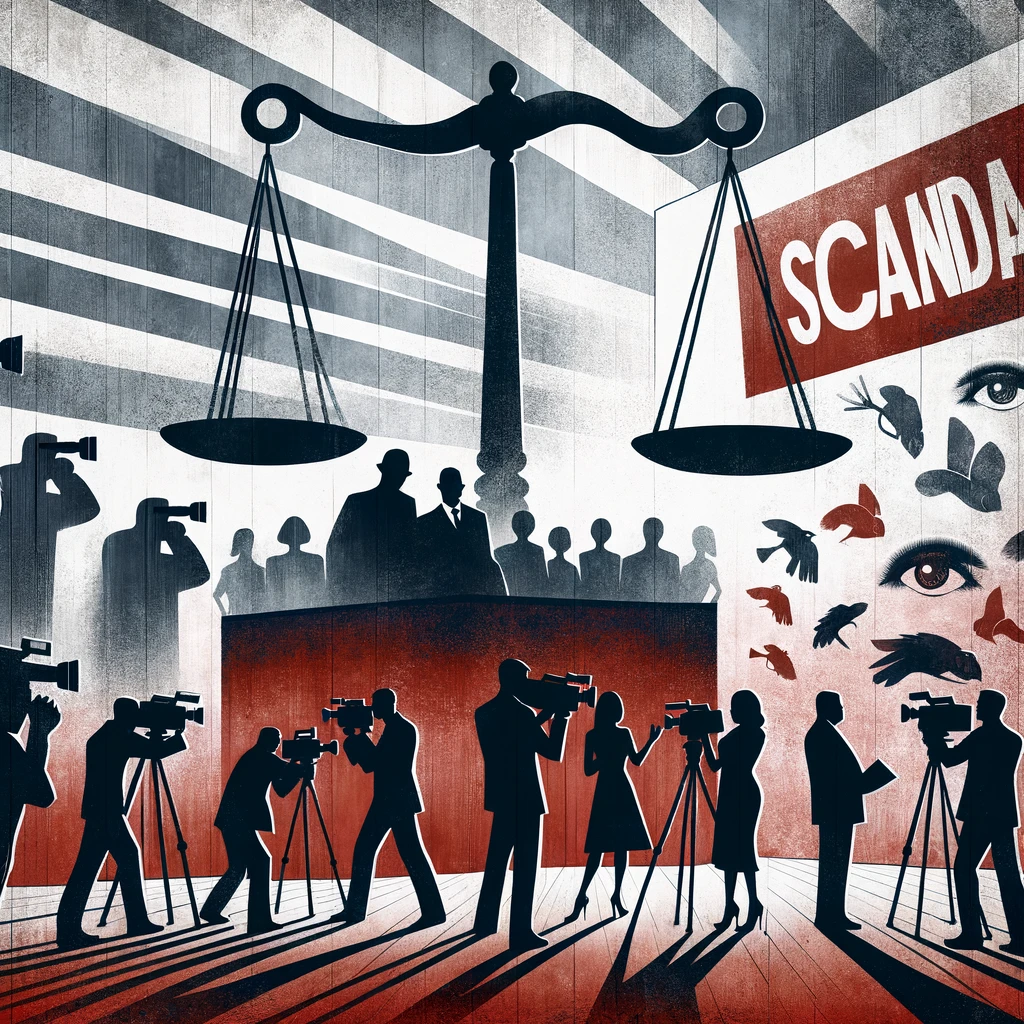Scandal
Definition
Scandal refers to an action or event regarded as morally or legally wrong and causing general public outrage or disgrace.
Parts of Speech
- Noun
Pronunciation
American English
- IPA Pronunciation: /ˈskændəl/
- Respelling: SKAN-dl (with "SKAN" as in "can," and "dl" indicating a blend of 'd' and a light 'l', similar to the ending of "paddle")
British English
- IPA Pronunciation: /ˈskændəl/
- Respelling: SKAN-dl (similar to American English, with "SKAN" as in "can," and "dl" indicating a blend of 'd' and a light 'l', similar to the ending of "paddle")
In both dialects, "scandal" features a prominent "SKAN" at the beginning and ends with a soft "dl," making the
Etymology
The term "scandal" comes from the Old French escandle, from Latin scandalum 'a trap or cause of moral stumbling', from Greek skandalon.
Derivatives
- Scandalous
- Scandalmonger
- Scandalize
- Unscandalize
- Scandalously
Synonyms
- Disgrace
- Shame
- Outrage
Antonyms
- Honor
- Glory
- Dignity
Usage
The term 'scandal' is often used to refer to significant instances of misconduct, especially those that receive wide public attention and disapproval.
Related Terms
- Scandalous
- Scandalmonger
- Scandalize
Detailed Definition
Noun
- Misconduct: An action or event regarded as morally or legally wrong, which causes general public outrage or disgrace.
- Example: The political scandal led to widespread unrest in the country.
- Disrepute: The state of being held in low esteem by the public.
- Example: His actions brought scandal upon the institution.
- Defamation: Harm caused to reputation by false or unfair accusations.
- Example: The celebrity sued for scandal after false rumors were spread about her.
scandal
.webp)


🇨🇳 Mandarin
- 丑闻 (chǒuwén)
- IPA Pronunciation: /ʈʂʰoʊ̯˨˩˦ wən˨˩˦/
- Respelling in English: cho-wen
- 污点 (wūdiǎn)
- IPA Pronunciation: /wu˥˥ tjɛn˨˩˦/
- Respelling in English: woo-dyen
🇮🇳 Hindi
- घोटाला (ghoṭālā)
- IPA Pronunciation: /ɡʱoːʈaːlaː/
- Respelling in English: ghotaala
- कांड (kāṇḍ)
- IPA Pronunciation: /kaːɳɖ/
- Respelling in English: kaand
🇪🇸 Spanish
- escándalo
- IPA Pronunciation: /esˈkandalo/
- Respelling in English: es-kan-da-lo
- afrenta
- IPA Pronunciation: /aˈfɾenta/
- Respelling in English: ah-fren-ta
🇫🇷 French
- scandale
- IPA Pronunciation: /skɑ̃dal/
- Respelling in English: skan-dal
- affaire
- IPA Pronunciation: /a.fɛʁ/
- Respelling in English: ah-fair
🇸🇦 Modern Standard Arabic
- فضيحة (faḍīḥa)
- IPA Pronunciation: /faˈdiːħa/
- Respelling in English: fad-i-ha
- أزمة (azma)
- IPA Pronunciation: /ˈʔuzma/
- Respelling in English: az-ma
🇧🇩 Bengali
- লজ্জা (lôjja)
- IPA Pronunciation: /lod͡ʒd͡ʒa/
- Respelling in English: lojja
- ঘটনা (ghôṭnā)
- IPA Pronunciation: /ɡʱɔʈna/
- Respelling in English: ghôtna
🇷🇺 Russian
- скандал (skandal)
- IPA Pronunciation: /skɐnˈdal/
- Respelling in English: skan-dal
- разоблачение (razoblachenie)
- IPA Pronunciation: /rəzɐˈblat͡ɕenʲɪje/
- Respelling in English: razo-blachen-ye
🇵🇹 Portuguese
- escândalo
- IPA Pronunciation: /isˈkɐ̃du.lu/
- Respelling in English: es-kand-doo-loo
- afronta
- IPA Pronunciation: /ɐˈfɾõtɐ/
- Respelling in English: ah-fron-ta
🇮🇩 Indonesian
- skandal
- IPA Pronunciation: /skandal/
- Respelling in English: skan-dal
- aib
- IPA Pronunciation: /aib/
- Respelling in English: aib
🇩🇪 German
- Skandal
- IPA Pronunciation: /ˈʃkan.dal/
- Respelling in English: shkan-dal
- Affäre
- IPA Pronunciation: /aˈfɛːʁə/
- Respelling in English: ah-fair-uh
🇯🇵 Japanese
- スキャンダル (sukyandaru)
- IPA Pronunciation: /sɯ̟ᵝkʲãndarɯ̟ᵝ/
- Respelling in English: su-kyan-da-ru
- 不祥事 (fushōji)
- IPA Pronunciation: /ɸɯ̟ᵝɕo̞ːʑi/
- Respelling in English: fu-sho-ji
🇻🇳 Vietnamese
- bê bối
- IPA Pronunciation: /be˧˩ bɔi˧˩/
- Respelling in English: beh boi
- sự việc xấu hổ
- IPA Pronunciation: /sʊ˨˩ viɛk˧˩ sɛu˧˩ hɔ˧˩/
- Respelling in English: soo viek seow ho
🇰🇷 Korean
- 스캔들 (seukaendeul)
- IPA Pronunciation: /sʰkʰændʌl/
- Respelling in English: seu-kaen-deul
- 추문 (chumun)
- IPA Pronunciation: /t͡ɕʰu.mun/
- Respelling in English: choo-moon
🇹🇷 Turkish
- skandal
- IPA Pronunciation: /skanˈdal/
- Respelling in English: skan-dal
- rezalet
- IPA Pronunciation: /rezaˈlet/
- Respelling in English: rez-a-let
🇵🇰 Urdu
- اسکینڈل (iskandal)
- IPA Pronunciation: /ɪsˈkændəl/
- Respelling in English: is-kan-del
- فضیحت (fazīḥat)
- IPA Pronunciation: /fəziːħət/
- Respelling in English: fazeehat





